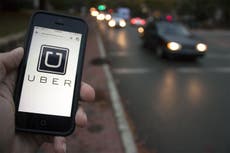Uber had this coming – it was never just a ‘tech platform’
Uber tried to get away with pretending it was a neutral software platform for far too long – all it did was link people together, and its responsibilities went as far as fixing glitches
Uber, time for you to call a taxi and go home. Except you might want to get into the habit of hailing one, since your licence to operate in London has been revoked.
Transport for London has informed the private car hire firm that it is “not fit and proper” for it to operate in the capital due to its lack of corporate responsibility in relation to public safety.
For a long time, Uber had attempted to sell itself as a neutral technology platform that offered the software to link up the owner of a rusting car on the driveway with a person in need of a ride. Underused cars got out on the road, drivers earned an extra few pounds in their spare time and passengers got to their appointments on time.
Outside of tech-utopian marketing campaigns, the reality was that Uber was never meant as a small scale, car sharing company, like the French BlaBlaCar. Instead its goal was always total market domination at any cost. To dispel any doubt of that, just look to the massive losses it is running in China. Its end goal, some argued, was to eventually introduce self-driving cars and sell off data harvests from journeys.
In London, it trampled competition from Addison Lee and black cabs by undermining their fares. But someone had to pay the price.
For a while it seemed like it was only the drivers who were bearing the burden of the company’s lean model. There was much legal haranguing over the status of drivers, and Uber’s determined efforts to ignore their glaringly obvious role as employees. That was, until last October when it lost a landmark employment tribunal which ruled that its drivers should be classified as workers and not self-employed contractors, and as a result they were owed worker benefits and protections.
There were others paying the price, and it was too often vulnerable women. In August, Uber was accused by the Metropolitan Police of allowing a driver who sexually assaulted a passenger to strike again by not reporting the attack as well as other serious crimes. Rather than reporting criminal complaints to the police, the tech start-up logged them with TfL, causing delays of up to seven months before crimes were investigated.
Inspector Neil Billany of the Met’s taxi and private hire team suggested that the reason for this was because the company was attempting to protect its reputation. When they were reported, the rough estimate is that between February 2015 and 2017 there were 48 sex attacks involving people who were Uber drivers at the time the attacks were reported.
The company claims that it required Disclosure and Barring Service checks and recorded the contact details of all drivers, but the rapidly expanding workforce meant that some drivers were falling through the cracks.
Uber isn’t the only sharing economy app that has become part of daily life in the capital. Since 2008, over four million people have stayed in an Airbnb in London. The company, which links guests up with empty rooms or homes in the capital, recently came under fire in the US for not properly screening a host who attempted to sexually assault a woman (a spokesman for Airbnb later told The Independent that a background check had been done on the host and that there had been no prior convictions). The legal ruling over Uber could now bring the responsibilities of other companies such as Airbnb into the limelight.
The rapid proliferation of these types of “gig economy” companies over the past few years has meant that many of them have forgotten their basic responsibilities toward their customers. As The Independent’s Josie Cox has written, they forgot that the sharing economy business model was based on trust – we had to have confidence that the strangers we were sharing cars with were safe, and they couldn’t provide that.
For too long, Uber tried to evade its role as anything more than a provider of tech. But we were never just sharing software; we were sharing our lives.
Uber tried to get away with pretending it was a neutral software platform for far too long – all it did was link people together, and its responsibilities went as far as fixing glitches. But it was always a private taxi hire firm. It was a company with employees, who it should have been paying properly from that start, and customers, who it should have been protecting.



Join our commenting forum
Join thought-provoking conversations, follow other Independent readers and see their replies